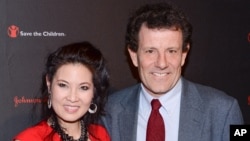The role of nonprofit organizations in addressing world poverty is the focus of an exhibit based on a book by journalists Nicholas Kristof and Sheryl WuDunn.
WuDunn said A Path Appears, which she co-wrote with her husband, looks at groups that help children and their families. The book was published last year, and the exhibit has just opened at the Skirball Cultural Center, a Jewish museum that highlights the democratic process. The title for both comes from the Chinese writer Lu Xun.
“He said that hope is like a path in the countryside," she said. "At first there is nothing. As more and more people walk back and forth, a path appears. We have those paths to solutions now.”
Innovative devices
The exhibit shows innovative devices like the Hippo Water Roller, which is sold by a social enterprise in South Africa. The rolling drum carries 90 liters of water and can be maneuvered by a child.
Another device, the Peepoo, is a biodegradable bag toilet that addresses the lack of sanitation in some communities. A solar pack in a suitcase provides lighting in others, and free soccer balls given to young people carry a message about stopping the spread of AIDS.
One group featured in the exhibit, called Chrysalis, helps the homeless in Los Angeles. Chief Executive Mark Loranger said homelessness is a multifaceted problem and that Chrysalis targets the issue through classes and on-the-job training.
WATCH: Official trailer for A Path Appears
“Employment, of course, is a huge piece of this [problem]," he said. "We need to make sure that those men and women that are ready, willing and able to work have an opportunity to do that.”
Other organizations featured in the exhibit focus on education, including the tuition-free Kibera School for Girls in Nairobi, Kenya, and South Central Scholars, a Los Angeles charity that helps inner-city students succeed in college.
Exhibit
The Fielding School of Public Health at the University of California-Los Angeles contributed data for the exhibit that show disparities in gender equality and childhood health and education, illustrating through graphic charts which countries offer free education through secondary school, or ban child marriage.
UCLA's Neal Baer, a physician and television producer, was guest curator for the exhibit and said visitors can get involved right away through a website called ActionLab.
“ActionLab is here literally at the end of the exhibit, and after you go through and see about 40 different organizations and their power changing people’s lives, we give you actionable steps you can take to get involved,” he said.
He said the message of the exhibit is that each of us can also make a difference.




